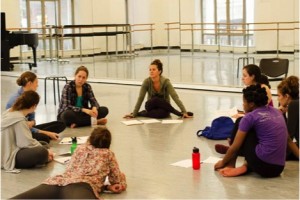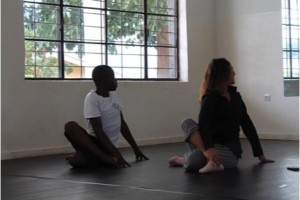MindLeaps is a rapidly growing NGO with a significant global impact. To continue accommodating the needs of our staff and students, we host an annual, weeklong teacher training program. This program prepares dance teachers physically, cognitively and culturally to teach at any of MindLeaps’ three international outlets.
The first element of this training is physical. We start each training day with a MindLeaps dance class. This class may be designed for young street kids, but it is tough even for professional dancers. All of our students love to dance, but most do not know what a codified dance technique looks like before entering our classroom. Therefore, MindLeaps’ instructors must perform at the highest technical level. We are not only instructing verbally, but also clearly demonstrating the physicality of the movements. Physical demonstration becomes especially important when you are dealing with a language barrier. (Which we often are!)
In the field, we can teach anywhere from two to six hours a day. This may not sound like a long time, but when you are moving at your fullest capacity, talking nonstop to keep the students engaged, attempting to incorporate a local language and expending a surplus of energy to inspire your students to work harder, you can end up quite exhausted. Teacher training breaks down specific breath patterns, speaking techniques and of course the physical dance class, to help teachers build the necessary stamina to teach effectively and efficiently.
The second component of the MindLeaps’ teacher training is learning about the cognitive skills at play throughout the class. MindLeaps uses a standardized dance curriculum that focuses on 8 cognitive and behavioral skills critical to future school success. The curriculum helps them develop their ability to concentrate, memorize, and use language, while, at the same time, helping them learn to work as a team, become more self-disciplined, and reinforcing their creativity and self-esteem. We give our trainees an in-depth knowledge of these 8 mental skills so they can understand how our curricula are defined to build these skills and monitor the progress of each skill. The initial findings of the Carnegie Mellon University Rwanda study show that, on average, students increase their cognitive skill score by 35% over 7 – 10 weeks. Our teachers are trained in a methodology that allows us to consistently achieve those results.
We also spend a tremendous amount of time practicing the most effective methods for teaching street kids. All of our teachers have extensive performance and teaching experience, but most are used to working with middle class, American families. Our students live in post-conflict countries with little to no formal education and a massive lack of support both financially and emotionally from their families (if they have any family at all). Ideas that are simple for us – such as paying attention for 20 seconds as you move across the floor – are extremely difficult for a child who must also think about where his next meal will come from or where he will sleep that evening. Traditional dance students practice tendus to prepare their bodies for a professional career in dance. MindLeaps’ students practice tendus to understand discipline, concentration and commitment.
The final component of MindLeaps’ teacher training is cultural preparation. Our programs are located in post-conflict countries. Each country has its own sad, complex history. It is so important, especially as a foreigner, to have a comprehensive knowledge of this history prior to travel. These conversations can be difficult, but often spark a deep desire to create change. These conversations remind us why our work as teachers of a beautiful universal language is so incredibly important. We discuss local customs, rebuilding efforts and our role, as international dance trainers, in the country’s rebuilding process. We always finish with a crash course in the local language to learn basic greetings, dance phrases and directional questions necessary to survive in a foreign country.
During my trip to Rwanda, I had the privilege of attending a traditional wedding ceremony for one of Rebecca’s closest Rwandan friends. At some point during the ceremony, I noticed the most adorable baby in the row behind us. I kept turning around to smile and laugh with him. After about 15 turn-arounds, the baby’s mother handed him to me. What a powerful moment for me! This woman, who didn’t know me, couldn’t communicate with me and could clearly see that I was one of three white people in the entire chapel just handed her child to me because she could see how happy he was making me. I had only been in Rwanda a few days at this point but was immediately struck by the sincere kindness and generosity of everyone I met.
The MindLeaps’ teacher training program fits a massive amount of preparation into one week. It is strenuous and maybe overwhelming at times. But, it is also invigorating to know that this single week of effort prepares you to make a lifetime of difference in the lives of so many young humans.
Caitlyn Casson is an administrative assistant and international dance trainer with MindLeaps. She has been with the company for three years and had the unique privilege to be involved in all three of the company’s teacher training programs.

